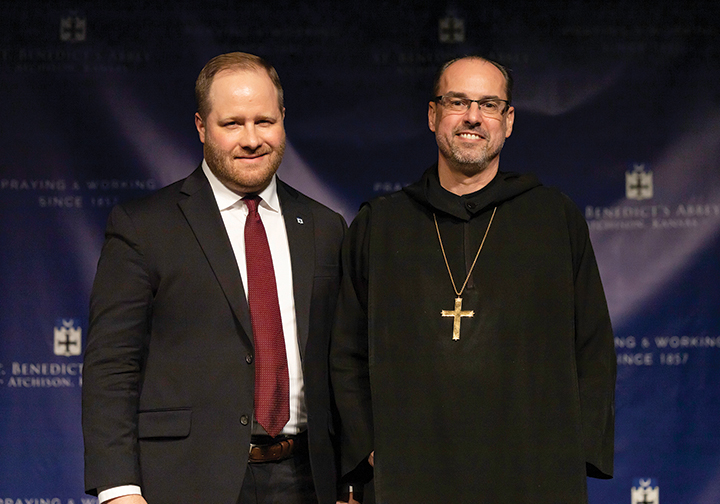
by James R. A. Merrick, Ph.D.
Special to The Leaven
ATCHISON — What do monks do? Ask your average person and nine times out of ten the answer will be: “Pray.”
It’s especially true of Benedictine monks, who celebrate the Liturgy of the Hours, the church’s official schedule of prayers which consists mainly of the psalms.
From the perspective of those outside, a life dedicated to prayer can seem futile and unproductive, surely chosen only by those who wish to escape the hard realities of daily life.
But from inside the monastery, it is the outside world that appears illusory, abuzz with lives that are full of compulsive consumerism, constant flitting from fleeting pleasures, only flirting with conviction and commitment, addicted to distraction. While the monk sets himself to a repetitive routine in order to soak in and be fully alive to reality as it is, modern people are never satisfied with what is before them, always buying or scrolling to the next thing.
Who is truly guilty of escaping reality here?

When the monastery is true to its purpose, it is dedicated to contemplating the source of all things, visible and invisible. It is therefore not out of touch, but profoundly in touch with the realities of daily life, even as it must strip away all the glitter heaped upon nature by modern people, so as to gain a purer view. Monastic life is but an attempt to understand earth from the vantage of heaven, this life in the light of the life to come, the temporal in terms of the eternal. In this way, the monastery bears witness to the world and church of the priority of God.
The Liturgy of the Hours is the touch point of this contemplation. And at the heart of this liturgical life is the miracle of the Eucharist, when rather trivial and common elements are transubstantiated into the divine life of the Son of God. The Eucharist is at the heart of the monastic life because it is iconic of what all of life should be and will be, a glorifying experience of God in all things, which is the motto of the Benedictines.
It is because of their dedication to the liturgy and the Eucharist that the monks of St. Benedict’s Abbey in Atchison chose to honor two people just before Easter at the 10th Abbot’s Table. On April 1, at the Overland Park Convention Center, Abbot James Albers, OSB, honored Bishop Andrew Cozzens of the Diocese of Crookston, Minnesota, and Adam Bartlett, founder of Source & Summit, with “Lumen Vitae” (“Light of Life”) medals.
The award is given each year to individuals, families or religious orders who, in their professional, philanthropic or vocational work, illumine the way in which Jesus Christ is the light of life.
Bartlett’s organization — Source & Summit — produces aids for the music of the Mass for parishes. Bartlett himself has composed numerous settings of the “propers” in English. (“Propers” are the parts of the Mass that are particular — or, proper — to the liturgical day.) As monks who are devoted to meditating on sacred Scripture, chiefly in the liturgy, Bartlett’s work on the antiphons was especially important. The antiphons are chanted portions of Scripture that occur during the Mass at the entrance, offertory and Communion. These passages of Scripture are meant to further bring out the theme of the Mass at critical junctures of the liturgy.
Thanks to Bartlett, parishes can now rediscover the lost art of chant in the context of a vernacular liturgy, as well as recover the antiphons, which are still the preferred music of the Mass.
Initially, Bishop Cozzens was chosen by St. Benedict’s Abbey because of his dedication to the pro-life cause. Bishop Cozzens and Abbot James met in the pro-life chapter during their days at Benedictine College. As a student, Albers was struck by his deep conviction and willingness to sacrifice for the unborn, which saw him arrested seven times. The young Cozzens did two stints in jail, even having to take his final exams early during his senior year so he could serve time.
But the monks also wanted to recognize Bishop Cozzens’ work on the National Eucharistic Revival for the USCCB. Humans cannot escape their deep desire for the sacred and eternal. The material world in which they live and move and have their being is created and sustained by the spiritual Word of God. Made in the image and likeness of God, human beings cannot be true to their nature apart from God. The Eucharist is so important — not just for Catholics, but for the world, because it is the singular instance of the supernatural sustenance of all things and a profound demonstration of the true dignity of the human person.
The monks of St. Benedict’s Abbey were truly delighted to honor Bartlett and Bishop Cozzens. They pray that both Source & Summit and the National Eucharistic Revival will have widespread influence so that God may be glorified in all things.
James Merrick is the director of communications and mission advancement of St. Benedict’s Abbey in Atchison.






